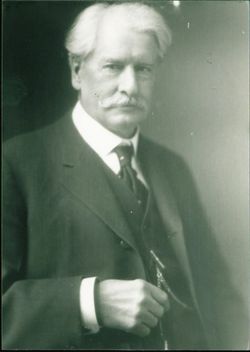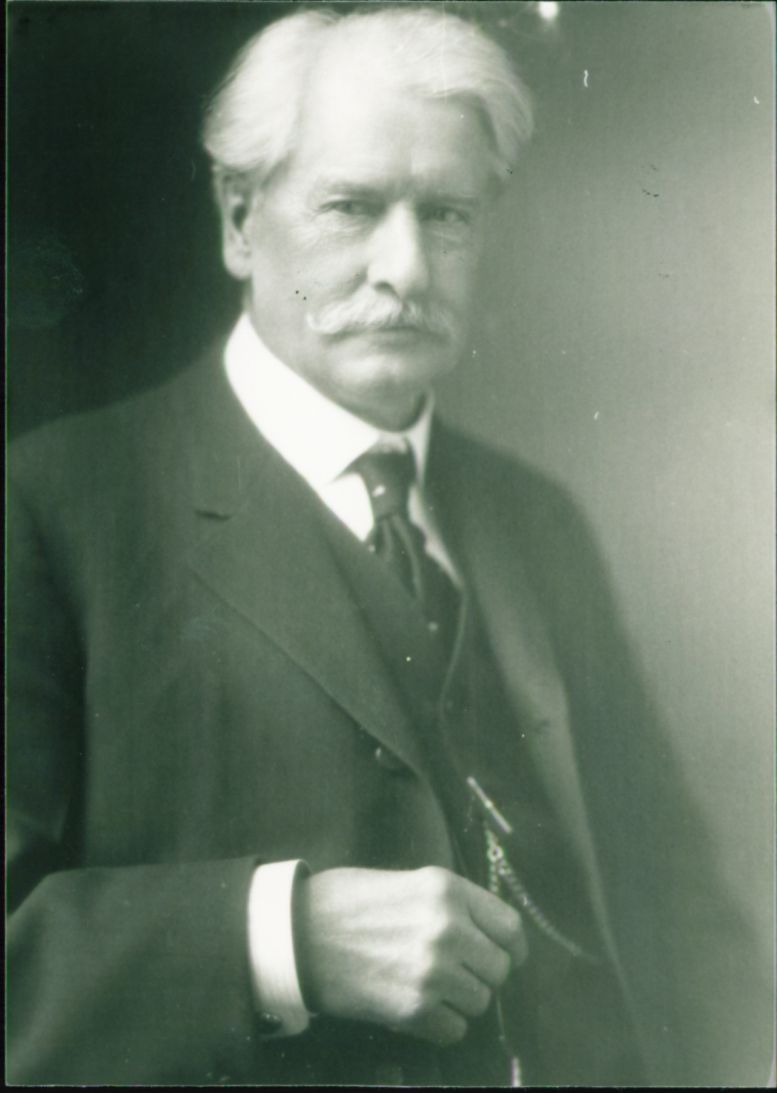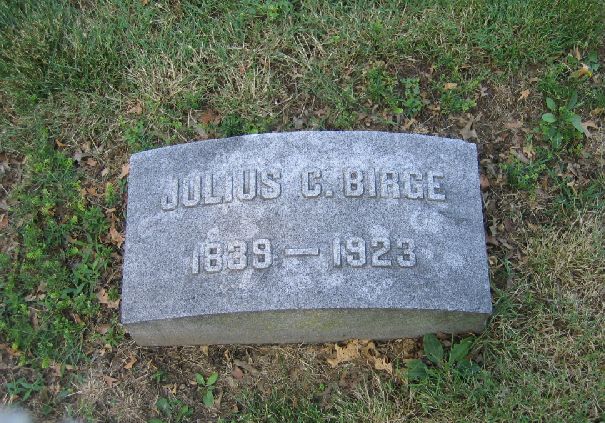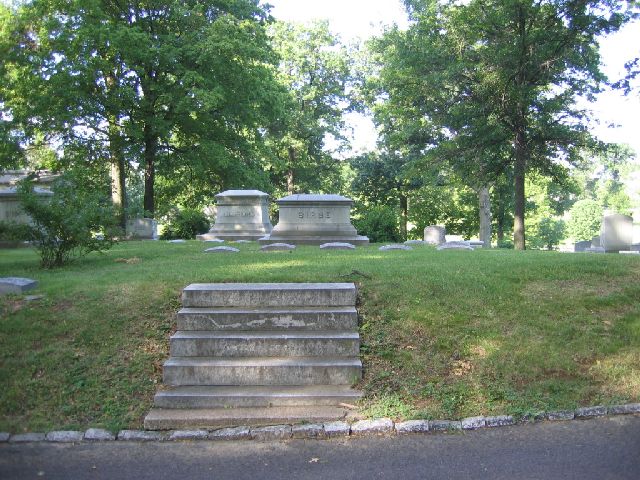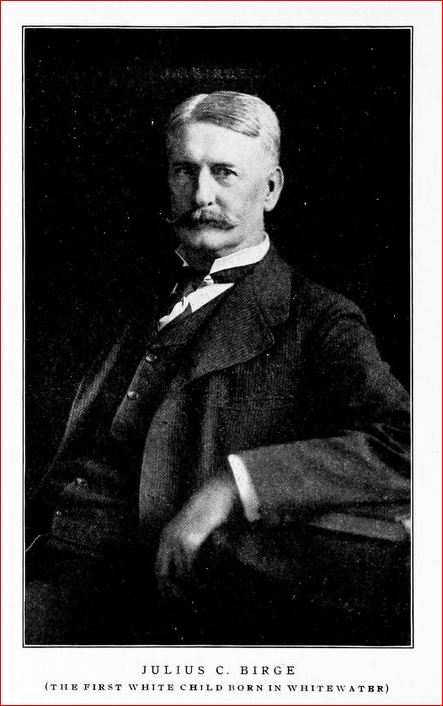The first actual evidence of his emigration in a 1640 land record for Windsor. Conn., to which the group removed in 1635-1636.He married Elizabeth Gaylord, the 26-year old eldest child of Deacon William Gaylord, whose well-to-do family are proven Mary and John passengers. If Richard was also on the Mary and John, he was probably baptized as the son of John Burge on 15 Sep 1611 in Ashwick, Somerset, England, because all the Mary and John passengers were from the West Country.
Julius was the eighth generation of Birges in America.
In 1839, Julius was the first child of European (i.e., non-Native American) descent born in Whitewater, Wisconsin, where his family were some of the earliest settlers. In an essay about his childhood included in Early Annals of Whitewater (Cravath, 1906), he describes growing up amidst the native people of the region, including Pottawattamies and Winnebagos.
From his journals (age 20 to 26), it is clear that in just two decades, Whitewater, which is about an hour from Milwaukee and was accessible by railroad, had become home to theater performances, visiting lecturers, a thespian club, glee club, library, metropolitan hall, several churches, a Masonic lodge, gymnasium and a steady stream of social gatherings. He writes about attending temperance crusades, choosing between different churches on any given Sunday, and frequently sleeping over at friends' homes after dances and parties – a sensible decision in a town without street lamps.
Julius milked cows and labored as almost everyone did in such a community, but he also started school at the age of three ("to help fill it up" he recorded much later) and clearly became well read in his life. His journals refer to reading Milton and Plutarch, and literary allusions appear through his 1912 book, The Awakening of the Desert, which chronicles his 1866 trip along the Oregon and Mormon Trails to Salt Lake City. The book is an important, primary source on the opening of the American West.
Julius apparently attended Beloit Academy for one year, but details are unclear as to when. Julius did not attend college.
His father, William, died suddenly when Julius was 20, probably of appendicitis, leaving him to take over the running of the town's flour mill, which William owned. The U.S. had suffered a financial panic in 1857, and the estate was significantly in debt. Julius' journals show how he gradually satisfied creditors within three years and found experienced millers whom he could trust to help manage the mill. As the only male in the household, he was responsible for providing for his mother, grandmother and three younger sisters. Two brothers and another sister had died through the years, and his sister Ada died of typhoid in 1864 when Julius was 24. He himself had contracted typhoid in 1863 and, after a long period of not recovering fully, he was advised by doctors to suspend working for a time, which is one reason he states for taking the 1866 trip.
While the facts are not known, it seems probable that he did not volunteer for service in the Civil War on account of being the family's sole support. However, one journal entry records that he registered for the draft, and numerous entries show that he enthusiastically supported the war effort at home. On the 1866 trip, there seems to be no animus between veterans and him, and his companion Ben Frees, who had served with a Wisconsin regiment, was a lifelong friend.
After his westward journey, it wasn't long before Julius moved to St. Louis where he remained for the rest of his life, extensive domestic and world travel notwithstanding. He had been made vice president of Winchester & Partridge Mfg. of Whitewater with the job of distributing its wagons and buggies in St. Louis. To this end, he organized the Semple & Birge Mfg. Co., and according to his son Stanley, the company distributed a wide variety of merchandise including agricultural implements. It also became the sole distributor for Seymour Manufacturing Co., of which Julius eventually took ownership. (Seymour remained family owned until 2012.) Semple and Birge went out of business in 1879, and Julius then organized the St. Louis Shovel Co., which eventually merged with four other companies to form Ames Shovel & Tool Co., taking its name from the largest of the five. Julius became vice president of Ames. He was also one of the first presidents of the American Hardware Manufacturers Association. Most indicative of his success, his wife's journal records attending a reception at the White House in 1898 and seeing President McKinley. Julius' obituary states that he was "active in civic affairs and practically all progressive movements since he came to St. Louis." In an interesting biographical note, his son Stanley writes that when Julius first moved to St. Louis, he realized that practically all his business contacts had middle initials, and not having a middle name, he adopted the middle initial "C," which never stood for any name.
He met his wife, Mary Jane Patrick, at a party in St. Louis in 1872. Late in her life she wrote, "After our first meeting we were never interested in anyone else. To me he was always as interesting as the first time I met him and we had a lovely companionship together for fifty years." Mary Jane must have been far more interesting to Julius than most of the women he met, as she herself had traveled through the West, crossing by railroad in 1868 to San Francisco, about six weeks after the completion of the Union Pacific. Together, they had six sons and two daughters. One daughter died as an infant, one son at age four of diphtheria and another at age 27 of tuberculosis.
Throughout their lives both Julius and Mary Jane maintained their love of travel. Another family memoirist, their granddaughter Barbara Birge Hager Wiseman, writes that they, "had a consuming interest in other people and other lands and were eager to travel while their health remained." Perhaps it was this interest in others – along with a classical sense of hospitality – that also led them always to invite any visitor to Pilgrim Congregational Church to come to their home for Sunday dinner. In old age, Julius came to be known as Pilgrim's "Grand Old Man."
Barbara Wiseman also describes summers the family spent in Charlevoix, Michigan where Julius served five years (1910 – 1915) as president of the Summer Home Association, later known as the Belvedere Club. She says, "Grandfather, particularly, was eager to open our eyes to the world outside our own orbit and he was always planning special activities for us in which he happily participated . . . He organized excursions across the lake to explore the unsettled woodlands where wild creatures, small and large, lived undisturbed by the reach of man. On crisp, clear nights when the Aurora Borealis could be seen trailing its gauzy, pastel veils across the northern sky, he climbed the hill to our cottage to rout us out of bed. Then he took us to the lake where, shivering from awe and a brisk north wind, we had a clear view of the celestial extravaganza. Most of all we loved the cool or rainy days when we would sit around the grate fire in his cozy living room while he told us of his life as a boy in Wisconsin; when the country was wild and empty and Indians were their close neighbors." With a lifelong affection for Whitewater, he not only told his grandchildren about the town, but also took some of them to see it. He and Mary Jane regularly visited his old friends during summers, and at Whitewater's seventieth anniversary celebration, Julius offered a commemorative address as the town's firstborn. He also gave the city a sizable ornamental fountain that remains a landmark there.
Julius died just four days after his and Mary Jane's golden wedding anniversary after an illness of about eight weeks. He was 84 years old. Mary Jane lived another four years.
The first actual evidence of his emigration in a 1640 land record for Windsor. Conn., to which the group removed in 1635-1636.He married Elizabeth Gaylord, the 26-year old eldest child of Deacon William Gaylord, whose well-to-do family are proven Mary and John passengers. If Richard was also on the Mary and John, he was probably baptized as the son of John Burge on 15 Sep 1611 in Ashwick, Somerset, England, because all the Mary and John passengers were from the West Country.
Julius was the eighth generation of Birges in America.
In 1839, Julius was the first child of European (i.e., non-Native American) descent born in Whitewater, Wisconsin, where his family were some of the earliest settlers. In an essay about his childhood included in Early Annals of Whitewater (Cravath, 1906), he describes growing up amidst the native people of the region, including Pottawattamies and Winnebagos.
From his journals (age 20 to 26), it is clear that in just two decades, Whitewater, which is about an hour from Milwaukee and was accessible by railroad, had become home to theater performances, visiting lecturers, a thespian club, glee club, library, metropolitan hall, several churches, a Masonic lodge, gymnasium and a steady stream of social gatherings. He writes about attending temperance crusades, choosing between different churches on any given Sunday, and frequently sleeping over at friends' homes after dances and parties – a sensible decision in a town without street lamps.
Julius milked cows and labored as almost everyone did in such a community, but he also started school at the age of three ("to help fill it up" he recorded much later) and clearly became well read in his life. His journals refer to reading Milton and Plutarch, and literary allusions appear through his 1912 book, The Awakening of the Desert, which chronicles his 1866 trip along the Oregon and Mormon Trails to Salt Lake City. The book is an important, primary source on the opening of the American West.
Julius apparently attended Beloit Academy for one year, but details are unclear as to when. Julius did not attend college.
His father, William, died suddenly when Julius was 20, probably of appendicitis, leaving him to take over the running of the town's flour mill, which William owned. The U.S. had suffered a financial panic in 1857, and the estate was significantly in debt. Julius' journals show how he gradually satisfied creditors within three years and found experienced millers whom he could trust to help manage the mill. As the only male in the household, he was responsible for providing for his mother, grandmother and three younger sisters. Two brothers and another sister had died through the years, and his sister Ada died of typhoid in 1864 when Julius was 24. He himself had contracted typhoid in 1863 and, after a long period of not recovering fully, he was advised by doctors to suspend working for a time, which is one reason he states for taking the 1866 trip.
While the facts are not known, it seems probable that he did not volunteer for service in the Civil War on account of being the family's sole support. However, one journal entry records that he registered for the draft, and numerous entries show that he enthusiastically supported the war effort at home. On the 1866 trip, there seems to be no animus between veterans and him, and his companion Ben Frees, who had served with a Wisconsin regiment, was a lifelong friend.
After his westward journey, it wasn't long before Julius moved to St. Louis where he remained for the rest of his life, extensive domestic and world travel notwithstanding. He had been made vice president of Winchester & Partridge Mfg. of Whitewater with the job of distributing its wagons and buggies in St. Louis. To this end, he organized the Semple & Birge Mfg. Co., and according to his son Stanley, the company distributed a wide variety of merchandise including agricultural implements. It also became the sole distributor for Seymour Manufacturing Co., of which Julius eventually took ownership. (Seymour remained family owned until 2012.) Semple and Birge went out of business in 1879, and Julius then organized the St. Louis Shovel Co., which eventually merged with four other companies to form Ames Shovel & Tool Co., taking its name from the largest of the five. Julius became vice president of Ames. He was also one of the first presidents of the American Hardware Manufacturers Association. Most indicative of his success, his wife's journal records attending a reception at the White House in 1898 and seeing President McKinley. Julius' obituary states that he was "active in civic affairs and practically all progressive movements since he came to St. Louis." In an interesting biographical note, his son Stanley writes that when Julius first moved to St. Louis, he realized that practically all his business contacts had middle initials, and not having a middle name, he adopted the middle initial "C," which never stood for any name.
He met his wife, Mary Jane Patrick, at a party in St. Louis in 1872. Late in her life she wrote, "After our first meeting we were never interested in anyone else. To me he was always as interesting as the first time I met him and we had a lovely companionship together for fifty years." Mary Jane must have been far more interesting to Julius than most of the women he met, as she herself had traveled through the West, crossing by railroad in 1868 to San Francisco, about six weeks after the completion of the Union Pacific. Together, they had six sons and two daughters. One daughter died as an infant, one son at age four of diphtheria and another at age 27 of tuberculosis.
Throughout their lives both Julius and Mary Jane maintained their love of travel. Another family memoirist, their granddaughter Barbara Birge Hager Wiseman, writes that they, "had a consuming interest in other people and other lands and were eager to travel while their health remained." Perhaps it was this interest in others – along with a classical sense of hospitality – that also led them always to invite any visitor to Pilgrim Congregational Church to come to their home for Sunday dinner. In old age, Julius came to be known as Pilgrim's "Grand Old Man."
Barbara Wiseman also describes summers the family spent in Charlevoix, Michigan where Julius served five years (1910 – 1915) as president of the Summer Home Association, later known as the Belvedere Club. She says, "Grandfather, particularly, was eager to open our eyes to the world outside our own orbit and he was always planning special activities for us in which he happily participated . . . He organized excursions across the lake to explore the unsettled woodlands where wild creatures, small and large, lived undisturbed by the reach of man. On crisp, clear nights when the Aurora Borealis could be seen trailing its gauzy, pastel veils across the northern sky, he climbed the hill to our cottage to rout us out of bed. Then he took us to the lake where, shivering from awe and a brisk north wind, we had a clear view of the celestial extravaganza. Most of all we loved the cool or rainy days when we would sit around the grate fire in his cozy living room while he told us of his life as a boy in Wisconsin; when the country was wild and empty and Indians were their close neighbors." With a lifelong affection for Whitewater, he not only told his grandchildren about the town, but also took some of them to see it. He and Mary Jane regularly visited his old friends during summers, and at Whitewater's seventieth anniversary celebration, Julius offered a commemorative address as the town's firstborn. He also gave the city a sizable ornamental fountain that remains a landmark there.
Julius died just four days after his and Mary Jane's golden wedding anniversary after an illness of about eight weeks. He was 84 years old. Mary Jane lived another four years.
